Business Environment Report: Sasol Limited - Globalisation Analysis
VerifiedAdded on 2023/01/17
|10
|2619
|91
Report
AI Summary
This report provides a comprehensive analysis of the business environment of Sasol Limited, a South African-based company. It begins with an introduction to the business environment and the concept of globalization, followed by an overview of Sasol Limited. The report then delves into the company's structure, culture, and governance, utilizing McKinsey's 7S model to assess alignment and effectiveness. It also evaluates ethical and sustainable factors in the global market, recognizing their importance for business operations. The application of Hofstede's cultural dimensions is explored to analyze the influences of globalization. Furthermore, the report examines ways to improve decision-making in a global context and identifies various routes to internationalization, including exporting and licensing, along with associated barriers. The report concludes by summarizing the key findings and emphasizing the importance of strategic planning for success in a globalized business environment.
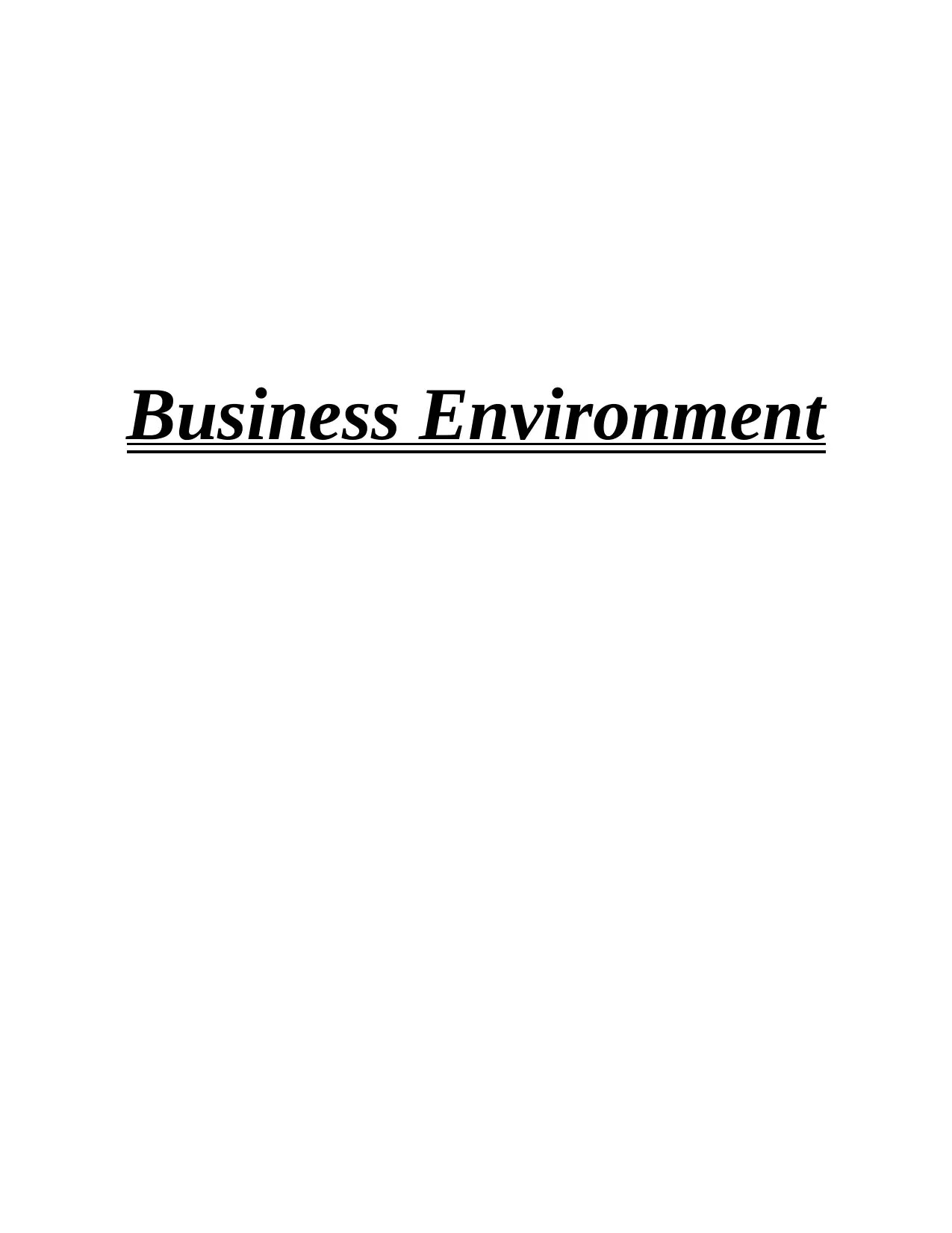
Business Environment
Paraphrase This Document
Need a fresh take? Get an instant paraphrase of this document with our AI Paraphraser
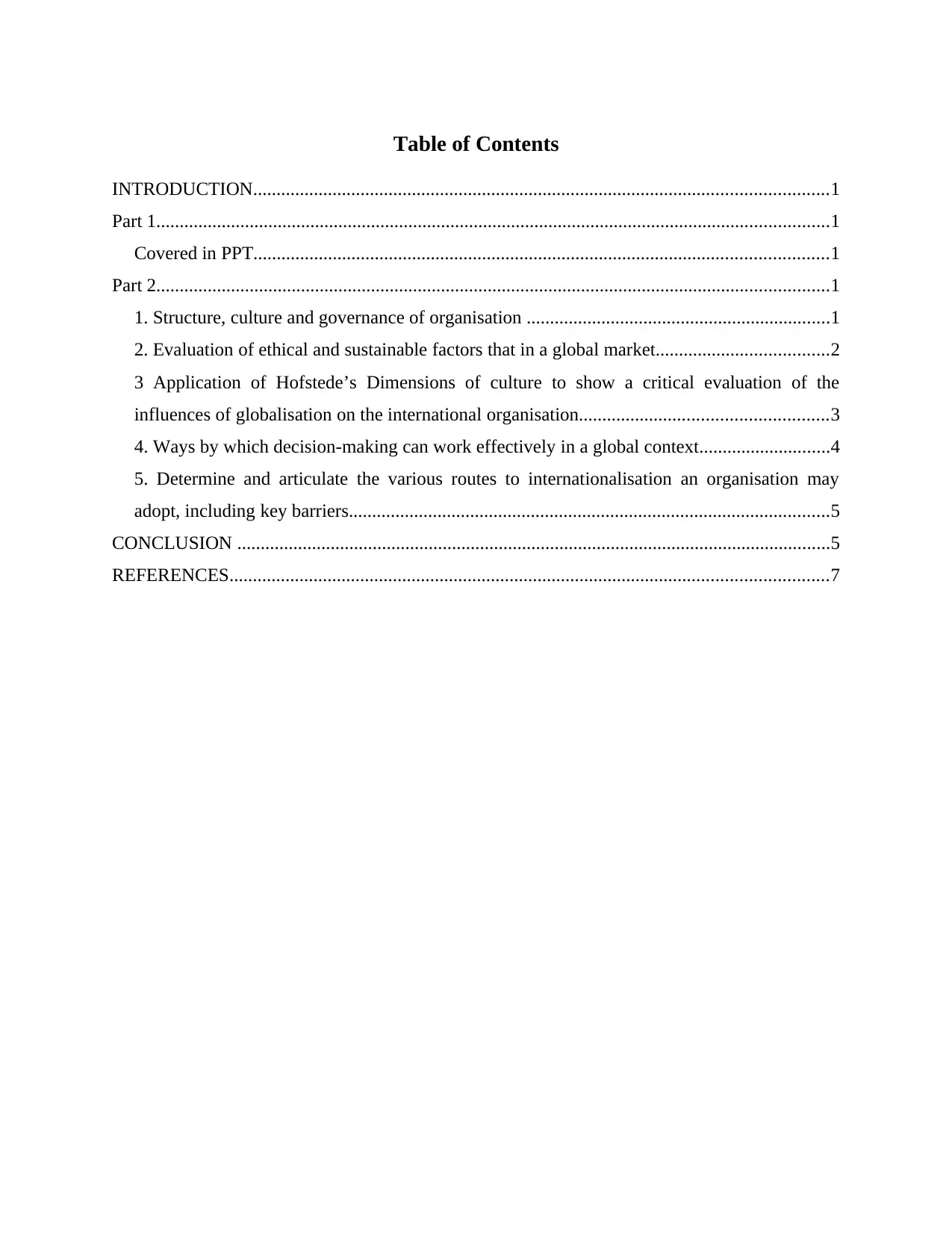
Table of Contents
INTRODUCTION...........................................................................................................................1
Part 1................................................................................................................................................1
Covered in PPT...........................................................................................................................1
Part 2................................................................................................................................................1
1. Structure, culture and governance of organisation .................................................................1
2. Evaluation of ethical and sustainable factors that in a global market.....................................2
3 Application of Hofstede’s Dimensions of culture to show a critical evaluation of the
influences of globalisation on the international organisation.....................................................3
4. Ways by which decision-making can work effectively in a global context............................4
5. Determine and articulate the various routes to internationalisation an organisation may
adopt, including key barriers.......................................................................................................5
CONCLUSION ...............................................................................................................................5
REFERENCES................................................................................................................................7
INTRODUCTION...........................................................................................................................1
Part 1................................................................................................................................................1
Covered in PPT...........................................................................................................................1
Part 2................................................................................................................................................1
1. Structure, culture and governance of organisation .................................................................1
2. Evaluation of ethical and sustainable factors that in a global market.....................................2
3 Application of Hofstede’s Dimensions of culture to show a critical evaluation of the
influences of globalisation on the international organisation.....................................................3
4. Ways by which decision-making can work effectively in a global context............................4
5. Determine and articulate the various routes to internationalisation an organisation may
adopt, including key barriers.......................................................................................................5
CONCLUSION ...............................................................................................................................5
REFERENCES................................................................................................................................7
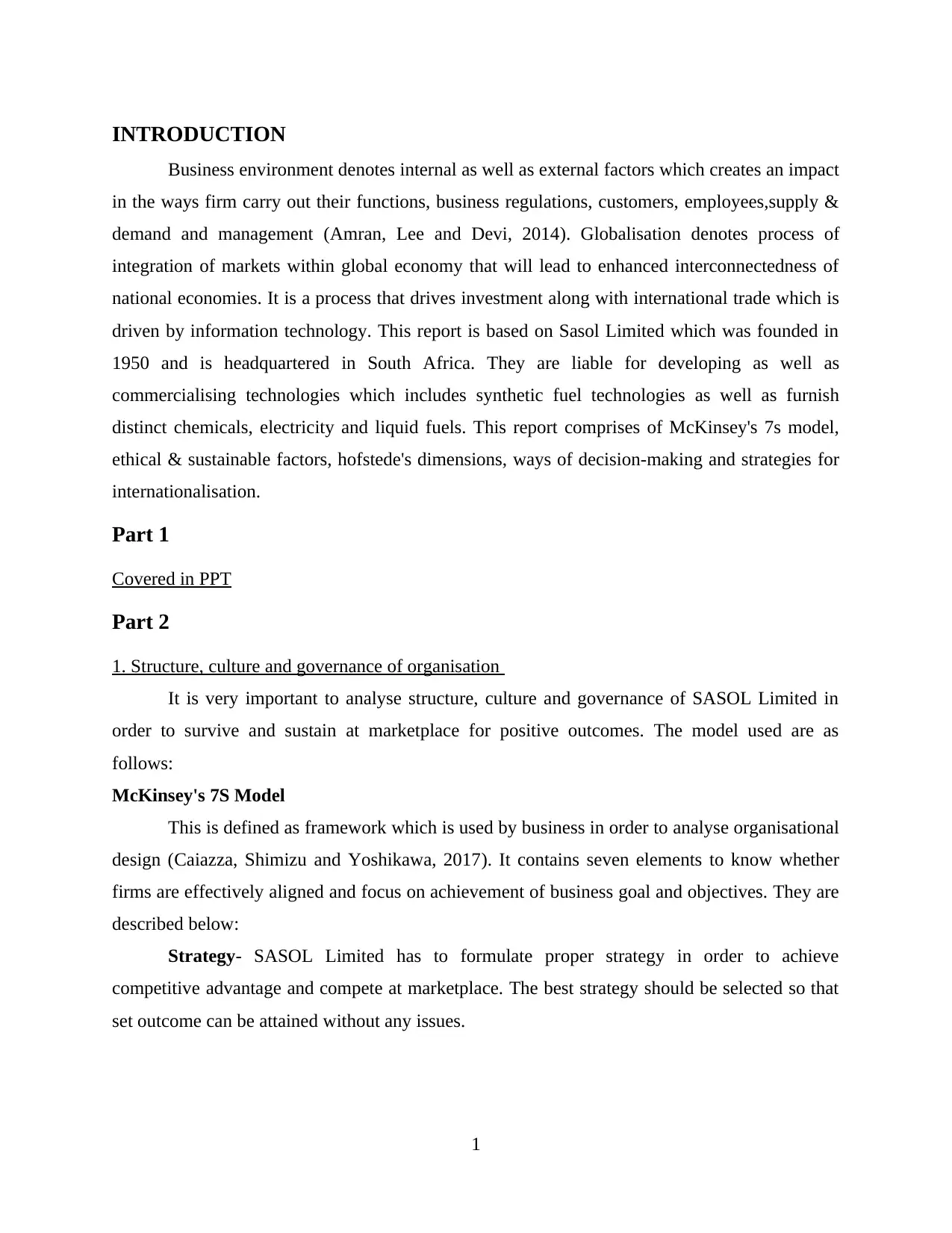
INTRODUCTION
Business environment denotes internal as well as external factors which creates an impact
in the ways firm carry out their functions, business regulations, customers, employees,supply &
demand and management (Amran, Lee and Devi, 2014). Globalisation denotes process of
integration of markets within global economy that will lead to enhanced interconnectedness of
national economies. It is a process that drives investment along with international trade which is
driven by information technology. This report is based on Sasol Limited which was founded in
1950 and is headquartered in South Africa. They are liable for developing as well as
commercialising technologies which includes synthetic fuel technologies as well as furnish
distinct chemicals, electricity and liquid fuels. This report comprises of McKinsey's 7s model,
ethical & sustainable factors, hofstede's dimensions, ways of decision-making and strategies for
internationalisation.
Part 1
Covered in PPT
Part 2
1. Structure, culture and governance of organisation
It is very important to analyse structure, culture and governance of SASOL Limited in
order to survive and sustain at marketplace for positive outcomes. The model used are as
follows:
McKinsey's 7S Model
This is defined as framework which is used by business in order to analyse organisational
design (Caiazza, Shimizu and Yoshikawa, 2017). It contains seven elements to know whether
firms are effectively aligned and focus on achievement of business goal and objectives. They are
described below:
Strategy- SASOL Limited has to formulate proper strategy in order to achieve
competitive advantage and compete at marketplace. The best strategy should be selected so that
set outcome can be attained without any issues.
1
Business environment denotes internal as well as external factors which creates an impact
in the ways firm carry out their functions, business regulations, customers, employees,supply &
demand and management (Amran, Lee and Devi, 2014). Globalisation denotes process of
integration of markets within global economy that will lead to enhanced interconnectedness of
national economies. It is a process that drives investment along with international trade which is
driven by information technology. This report is based on Sasol Limited which was founded in
1950 and is headquartered in South Africa. They are liable for developing as well as
commercialising technologies which includes synthetic fuel technologies as well as furnish
distinct chemicals, electricity and liquid fuels. This report comprises of McKinsey's 7s model,
ethical & sustainable factors, hofstede's dimensions, ways of decision-making and strategies for
internationalisation.
Part 1
Covered in PPT
Part 2
1. Structure, culture and governance of organisation
It is very important to analyse structure, culture and governance of SASOL Limited in
order to survive and sustain at marketplace for positive outcomes. The model used are as
follows:
McKinsey's 7S Model
This is defined as framework which is used by business in order to analyse organisational
design (Caiazza, Shimizu and Yoshikawa, 2017). It contains seven elements to know whether
firms are effectively aligned and focus on achievement of business goal and objectives. They are
described below:
Strategy- SASOL Limited has to formulate proper strategy in order to achieve
competitive advantage and compete at marketplace. The best strategy should be selected so that
set outcome can be attained without any issues.
1
⊘ This is a preview!⊘
Do you want full access?
Subscribe today to unlock all pages.

Trusted by 1+ million students worldwide
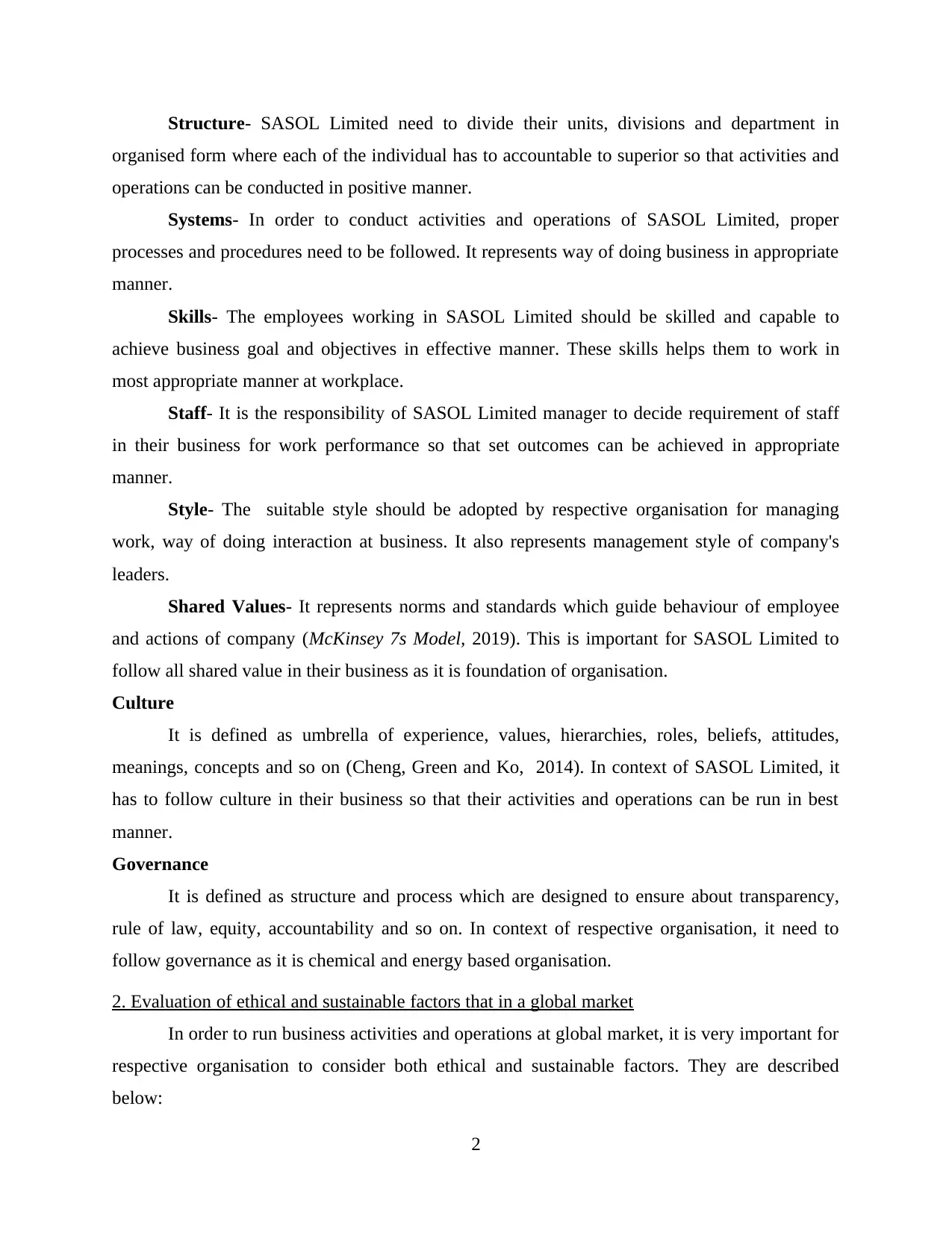
Structure- SASOL Limited need to divide their units, divisions and department in
organised form where each of the individual has to accountable to superior so that activities and
operations can be conducted in positive manner.
Systems- In order to conduct activities and operations of SASOL Limited, proper
processes and procedures need to be followed. It represents way of doing business in appropriate
manner.
Skills- The employees working in SASOL Limited should be skilled and capable to
achieve business goal and objectives in effective manner. These skills helps them to work in
most appropriate manner at workplace.
Staff- It is the responsibility of SASOL Limited manager to decide requirement of staff
in their business for work performance so that set outcomes can be achieved in appropriate
manner.
Style- The suitable style should be adopted by respective organisation for managing
work, way of doing interaction at business. It also represents management style of company's
leaders.
Shared Values- It represents norms and standards which guide behaviour of employee
and actions of company (McKinsey 7s Model, 2019). This is important for SASOL Limited to
follow all shared value in their business as it is foundation of organisation.
Culture
It is defined as umbrella of experience, values, hierarchies, roles, beliefs, attitudes,
meanings, concepts and so on (Cheng, Green and Ko, 2014). In context of SASOL Limited, it
has to follow culture in their business so that their activities and operations can be run in best
manner.
Governance
It is defined as structure and process which are designed to ensure about transparency,
rule of law, equity, accountability and so on. In context of respective organisation, it need to
follow governance as it is chemical and energy based organisation.
2. Evaluation of ethical and sustainable factors that in a global market
In order to run business activities and operations at global market, it is very important for
respective organisation to consider both ethical and sustainable factors. They are described
below:
2
organised form where each of the individual has to accountable to superior so that activities and
operations can be conducted in positive manner.
Systems- In order to conduct activities and operations of SASOL Limited, proper
processes and procedures need to be followed. It represents way of doing business in appropriate
manner.
Skills- The employees working in SASOL Limited should be skilled and capable to
achieve business goal and objectives in effective manner. These skills helps them to work in
most appropriate manner at workplace.
Staff- It is the responsibility of SASOL Limited manager to decide requirement of staff
in their business for work performance so that set outcomes can be achieved in appropriate
manner.
Style- The suitable style should be adopted by respective organisation for managing
work, way of doing interaction at business. It also represents management style of company's
leaders.
Shared Values- It represents norms and standards which guide behaviour of employee
and actions of company (McKinsey 7s Model, 2019). This is important for SASOL Limited to
follow all shared value in their business as it is foundation of organisation.
Culture
It is defined as umbrella of experience, values, hierarchies, roles, beliefs, attitudes,
meanings, concepts and so on (Cheng, Green and Ko, 2014). In context of SASOL Limited, it
has to follow culture in their business so that their activities and operations can be run in best
manner.
Governance
It is defined as structure and process which are designed to ensure about transparency,
rule of law, equity, accountability and so on. In context of respective organisation, it need to
follow governance as it is chemical and energy based organisation.
2. Evaluation of ethical and sustainable factors that in a global market
In order to run business activities and operations at global market, it is very important for
respective organisation to consider both ethical and sustainable factors. They are described
below:
2
Paraphrase This Document
Need a fresh take? Get an instant paraphrase of this document with our AI Paraphraser
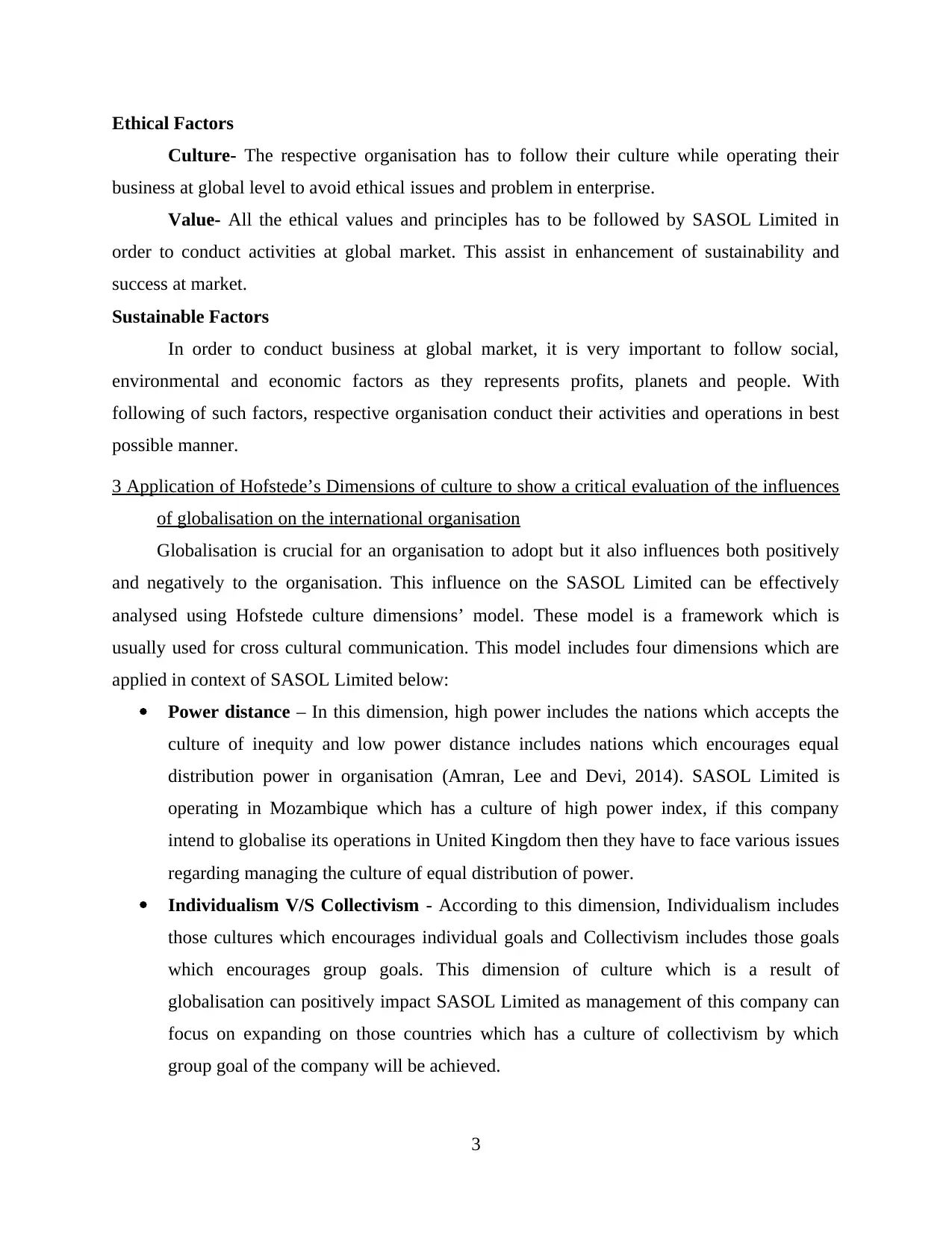
Ethical Factors
Culture- The respective organisation has to follow their culture while operating their
business at global level to avoid ethical issues and problem in enterprise.
Value- All the ethical values and principles has to be followed by SASOL Limited in
order to conduct activities at global market. This assist in enhancement of sustainability and
success at market.
Sustainable Factors
In order to conduct business at global market, it is very important to follow social,
environmental and economic factors as they represents profits, planets and people. With
following of such factors, respective organisation conduct their activities and operations in best
possible manner.
3 Application of Hofstede’s Dimensions of culture to show a critical evaluation of the influences
of globalisation on the international organisation
Globalisation is crucial for an organisation to adopt but it also influences both positively
and negatively to the organisation. This influence on the SASOL Limited can be effectively
analysed using Hofstede culture dimensions’ model. These model is a framework which is
usually used for cross cultural communication. This model includes four dimensions which are
applied in context of SASOL Limited below:
Power distance – In this dimension, high power includes the nations which accepts the
culture of inequity and low power distance includes nations which encourages equal
distribution power in organisation (Amran, Lee and Devi, 2014). SASOL Limited is
operating in Mozambique which has a culture of high power index, if this company
intend to globalise its operations in United Kingdom then they have to face various issues
regarding managing the culture of equal distribution of power.
Individualism V/S Collectivism - According to this dimension, Individualism includes
those cultures which encourages individual goals and Collectivism includes those goals
which encourages group goals. This dimension of culture which is a result of
globalisation can positively impact SASOL Limited as management of this company can
focus on expanding on those countries which has a culture of collectivism by which
group goal of the company will be achieved.
3
Culture- The respective organisation has to follow their culture while operating their
business at global level to avoid ethical issues and problem in enterprise.
Value- All the ethical values and principles has to be followed by SASOL Limited in
order to conduct activities at global market. This assist in enhancement of sustainability and
success at market.
Sustainable Factors
In order to conduct business at global market, it is very important to follow social,
environmental and economic factors as they represents profits, planets and people. With
following of such factors, respective organisation conduct their activities and operations in best
possible manner.
3 Application of Hofstede’s Dimensions of culture to show a critical evaluation of the influences
of globalisation on the international organisation
Globalisation is crucial for an organisation to adopt but it also influences both positively
and negatively to the organisation. This influence on the SASOL Limited can be effectively
analysed using Hofstede culture dimensions’ model. These model is a framework which is
usually used for cross cultural communication. This model includes four dimensions which are
applied in context of SASOL Limited below:
Power distance – In this dimension, high power includes the nations which accepts the
culture of inequity and low power distance includes nations which encourages equal
distribution power in organisation (Amran, Lee and Devi, 2014). SASOL Limited is
operating in Mozambique which has a culture of high power index, if this company
intend to globalise its operations in United Kingdom then they have to face various issues
regarding managing the culture of equal distribution of power.
Individualism V/S Collectivism - According to this dimension, Individualism includes
those cultures which encourages individual goals and Collectivism includes those goals
which encourages group goals. This dimension of culture which is a result of
globalisation can positively impact SASOL Limited as management of this company can
focus on expanding on those countries which has a culture of collectivism by which
group goal of the company will be achieved.
3
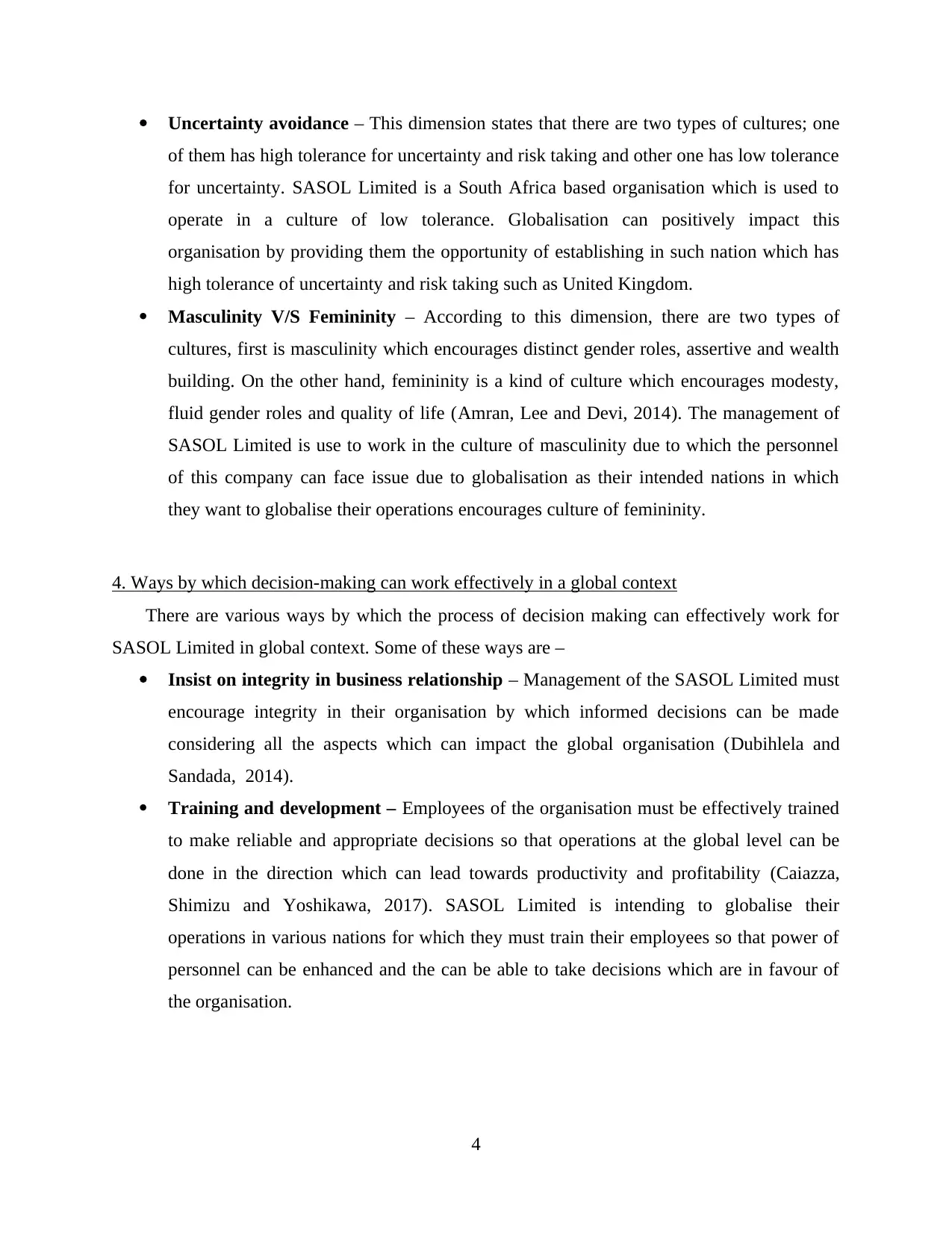
Uncertainty avoidance – This dimension states that there are two types of cultures; one
of them has high tolerance for uncertainty and risk taking and other one has low tolerance
for uncertainty. SASOL Limited is a South Africa based organisation which is used to
operate in a culture of low tolerance. Globalisation can positively impact this
organisation by providing them the opportunity of establishing in such nation which has
high tolerance of uncertainty and risk taking such as United Kingdom.
Masculinity V/S Femininity – According to this dimension, there are two types of
cultures, first is masculinity which encourages distinct gender roles, assertive and wealth
building. On the other hand, femininity is a kind of culture which encourages modesty,
fluid gender roles and quality of life (Amran, Lee and Devi, 2014). The management of
SASOL Limited is use to work in the culture of masculinity due to which the personnel
of this company can face issue due to globalisation as their intended nations in which
they want to globalise their operations encourages culture of femininity.
4. Ways by which decision-making can work effectively in a global context
There are various ways by which the process of decision making can effectively work for
SASOL Limited in global context. Some of these ways are –
Insist on integrity in business relationship – Management of the SASOL Limited must
encourage integrity in their organisation by which informed decisions can be made
considering all the aspects which can impact the global organisation (Dubihlela and
Sandada, 2014).
Training and development – Employees of the organisation must be effectively trained
to make reliable and appropriate decisions so that operations at the global level can be
done in the direction which can lead towards productivity and profitability (Caiazza,
Shimizu and Yoshikawa, 2017). SASOL Limited is intending to globalise their
operations in various nations for which they must train their employees so that power of
personnel can be enhanced and the can be able to take decisions which are in favour of
the organisation.
4
of them has high tolerance for uncertainty and risk taking and other one has low tolerance
for uncertainty. SASOL Limited is a South Africa based organisation which is used to
operate in a culture of low tolerance. Globalisation can positively impact this
organisation by providing them the opportunity of establishing in such nation which has
high tolerance of uncertainty and risk taking such as United Kingdom.
Masculinity V/S Femininity – According to this dimension, there are two types of
cultures, first is masculinity which encourages distinct gender roles, assertive and wealth
building. On the other hand, femininity is a kind of culture which encourages modesty,
fluid gender roles and quality of life (Amran, Lee and Devi, 2014). The management of
SASOL Limited is use to work in the culture of masculinity due to which the personnel
of this company can face issue due to globalisation as their intended nations in which
they want to globalise their operations encourages culture of femininity.
4. Ways by which decision-making can work effectively in a global context
There are various ways by which the process of decision making can effectively work for
SASOL Limited in global context. Some of these ways are –
Insist on integrity in business relationship – Management of the SASOL Limited must
encourage integrity in their organisation by which informed decisions can be made
considering all the aspects which can impact the global organisation (Dubihlela and
Sandada, 2014).
Training and development – Employees of the organisation must be effectively trained
to make reliable and appropriate decisions so that operations at the global level can be
done in the direction which can lead towards productivity and profitability (Caiazza,
Shimizu and Yoshikawa, 2017). SASOL Limited is intending to globalise their
operations in various nations for which they must train their employees so that power of
personnel can be enhanced and the can be able to take decisions which are in favour of
the organisation.
4
⊘ This is a preview!⊘
Do you want full access?
Subscribe today to unlock all pages.

Trusted by 1+ million students worldwide
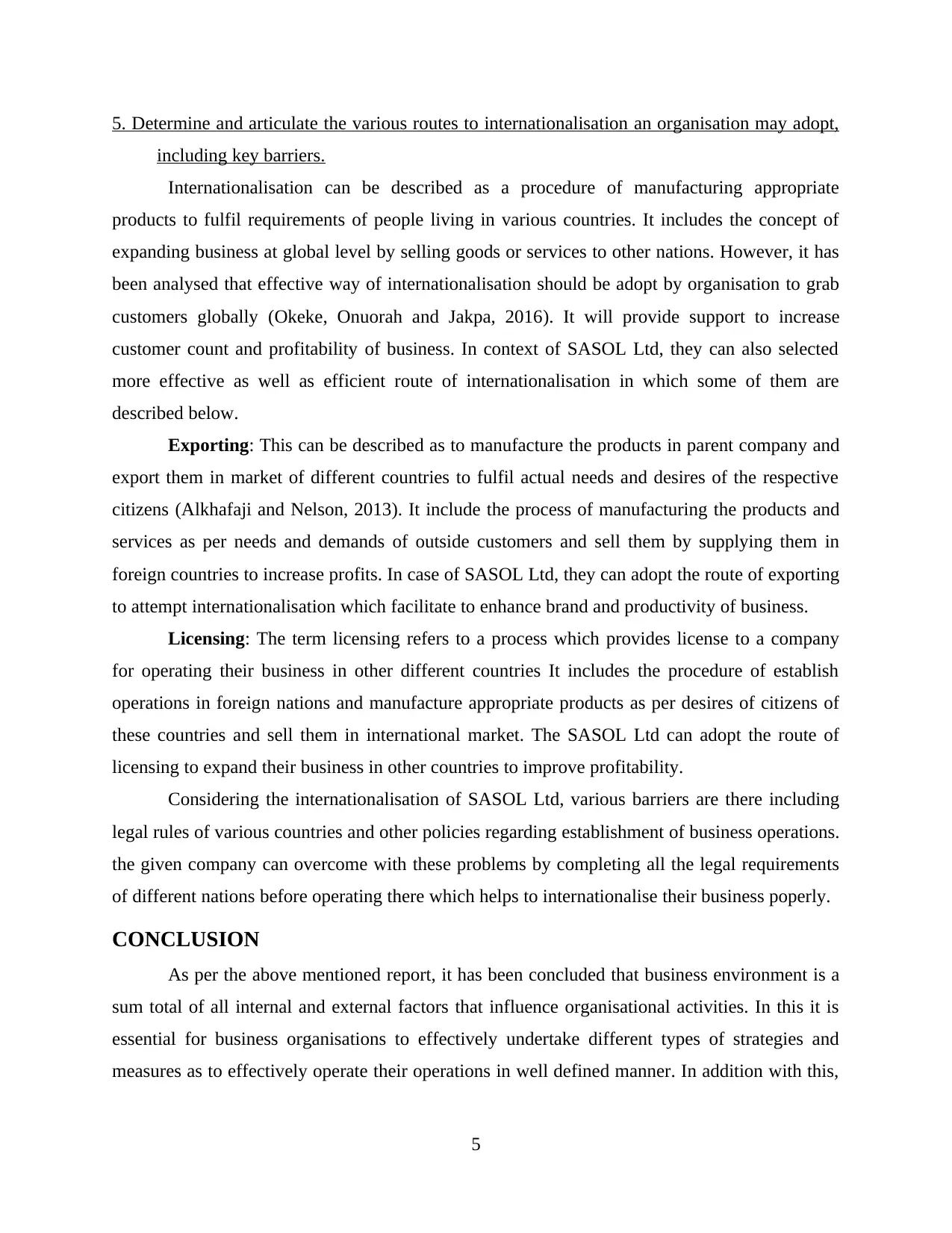
5. Determine and articulate the various routes to internationalisation an organisation may adopt,
including key barriers.
Internationalisation can be described as a procedure of manufacturing appropriate
products to fulfil requirements of people living in various countries. It includes the concept of
expanding business at global level by selling goods or services to other nations. However, it has
been analysed that effective way of internationalisation should be adopt by organisation to grab
customers globally (Okeke, Onuorah and Jakpa, 2016). It will provide support to increase
customer count and profitability of business. In context of SASOL Ltd, they can also selected
more effective as well as efficient route of internationalisation in which some of them are
described below.
Exporting: This can be described as to manufacture the products in parent company and
export them in market of different countries to fulfil actual needs and desires of the respective
citizens (Alkhafaji and Nelson, 2013). It include the process of manufacturing the products and
services as per needs and demands of outside customers and sell them by supplying them in
foreign countries to increase profits. In case of SASOL Ltd, they can adopt the route of exporting
to attempt internationalisation which facilitate to enhance brand and productivity of business.
Licensing: The term licensing refers to a process which provides license to a company
for operating their business in other different countries It includes the procedure of establish
operations in foreign nations and manufacture appropriate products as per desires of citizens of
these countries and sell them in international market. The SASOL Ltd can adopt the route of
licensing to expand their business in other countries to improve profitability.
Considering the internationalisation of SASOL Ltd, various barriers are there including
legal rules of various countries and other policies regarding establishment of business operations.
the given company can overcome with these problems by completing all the legal requirements
of different nations before operating there which helps to internationalise their business poperly.
CONCLUSION
As per the above mentioned report, it has been concluded that business environment is a
sum total of all internal and external factors that influence organisational activities. In this it is
essential for business organisations to effectively undertake different types of strategies and
measures as to effectively operate their operations in well defined manner. In addition with this,
5
including key barriers.
Internationalisation can be described as a procedure of manufacturing appropriate
products to fulfil requirements of people living in various countries. It includes the concept of
expanding business at global level by selling goods or services to other nations. However, it has
been analysed that effective way of internationalisation should be adopt by organisation to grab
customers globally (Okeke, Onuorah and Jakpa, 2016). It will provide support to increase
customer count and profitability of business. In context of SASOL Ltd, they can also selected
more effective as well as efficient route of internationalisation in which some of them are
described below.
Exporting: This can be described as to manufacture the products in parent company and
export them in market of different countries to fulfil actual needs and desires of the respective
citizens (Alkhafaji and Nelson, 2013). It include the process of manufacturing the products and
services as per needs and demands of outside customers and sell them by supplying them in
foreign countries to increase profits. In case of SASOL Ltd, they can adopt the route of exporting
to attempt internationalisation which facilitate to enhance brand and productivity of business.
Licensing: The term licensing refers to a process which provides license to a company
for operating their business in other different countries It includes the procedure of establish
operations in foreign nations and manufacture appropriate products as per desires of citizens of
these countries and sell them in international market. The SASOL Ltd can adopt the route of
licensing to expand their business in other countries to improve profitability.
Considering the internationalisation of SASOL Ltd, various barriers are there including
legal rules of various countries and other policies regarding establishment of business operations.
the given company can overcome with these problems by completing all the legal requirements
of different nations before operating there which helps to internationalise their business poperly.
CONCLUSION
As per the above mentioned report, it has been concluded that business environment is a
sum total of all internal and external factors that influence organisational activities. In this it is
essential for business organisations to effectively undertake different types of strategies and
measures as to effectively operate their operations in well defined manner. In addition with this,
5
Paraphrase This Document
Need a fresh take? Get an instant paraphrase of this document with our AI Paraphraser
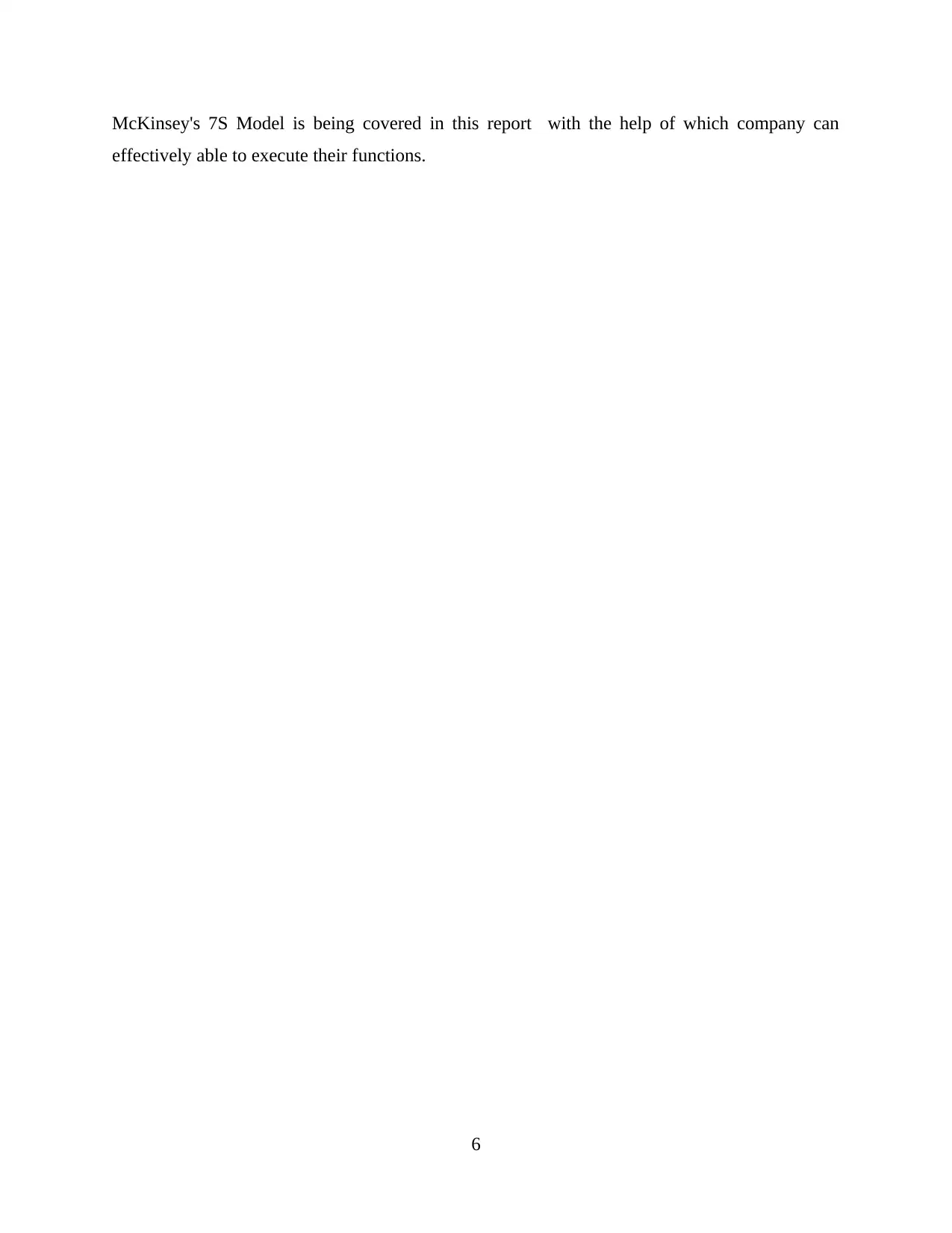
McKinsey's 7S Model is being covered in this report with the help of which company can
effectively able to execute their functions.
6
effectively able to execute their functions.
6
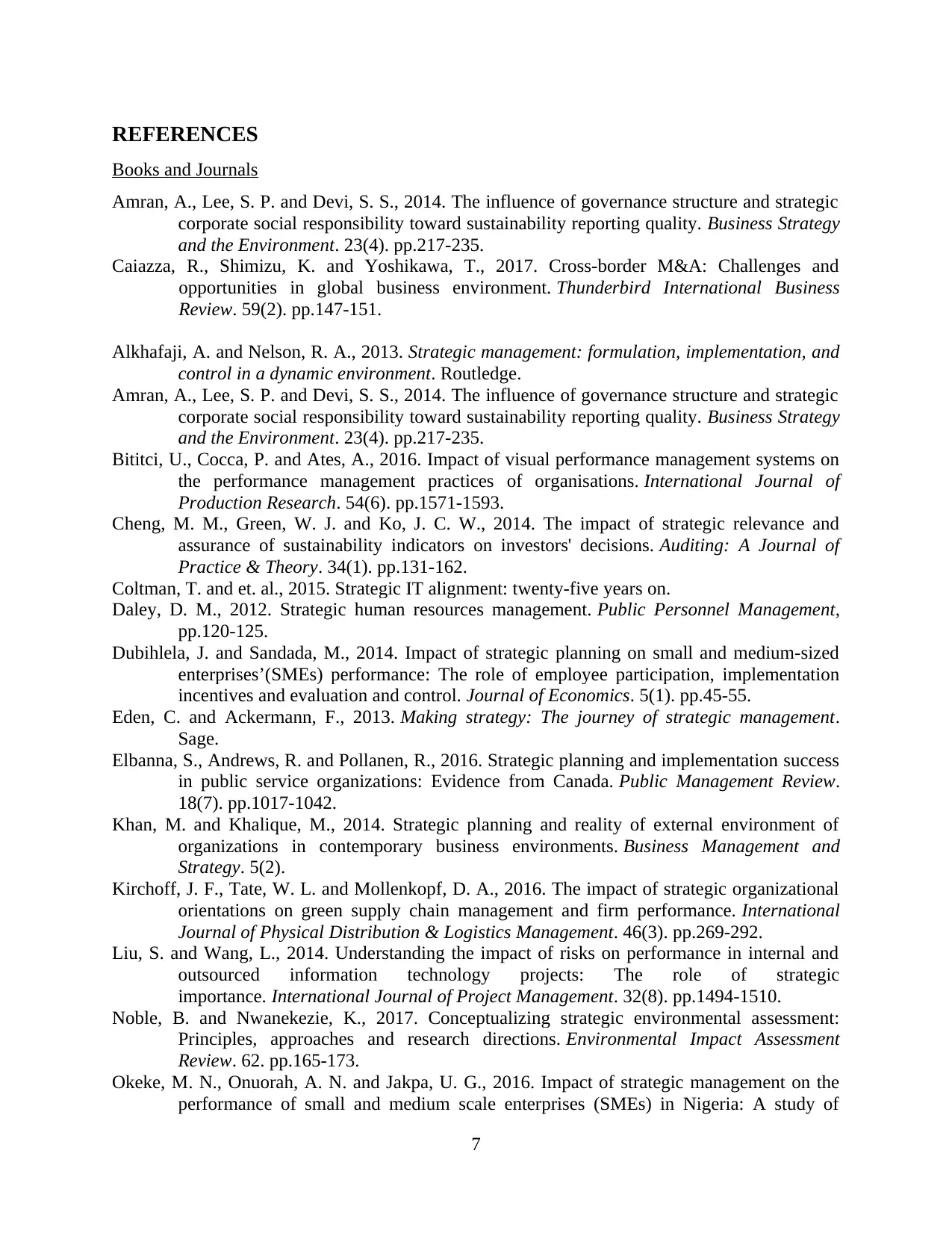
REFERENCES
Books and Journals
Amran, A., Lee, S. P. and Devi, S. S., 2014. The influence of governance structure and strategic
corporate social responsibility toward sustainability reporting quality. Business Strategy
and the Environment. 23(4). pp.217-235.
Caiazza, R., Shimizu, K. and Yoshikawa, T., 2017. Cross‐border M&A: Challenges and
opportunities in global business environment. Thunderbird International Business
Review. 59(2). pp.147-151.
Alkhafaji, A. and Nelson, R. A., 2013. Strategic management: formulation, implementation, and
control in a dynamic environment. Routledge.
Amran, A., Lee, S. P. and Devi, S. S., 2014. The influence of governance structure and strategic
corporate social responsibility toward sustainability reporting quality. Business Strategy
and the Environment. 23(4). pp.217-235.
Bititci, U., Cocca, P. and Ates, A., 2016. Impact of visual performance management systems on
the performance management practices of organisations. International Journal of
Production Research. 54(6). pp.1571-1593.
Cheng, M. M., Green, W. J. and Ko, J. C. W., 2014. The impact of strategic relevance and
assurance of sustainability indicators on investors' decisions. Auditing: A Journal of
Practice & Theory. 34(1). pp.131-162.
Coltman, T. and et. al., 2015. Strategic IT alignment: twenty-five years on.
Daley, D. M., 2012. Strategic human resources management. Public Personnel Management,
pp.120-125.
Dubihlela, J. and Sandada, M., 2014. Impact of strategic planning on small and medium-sized
enterprises’(SMEs) performance: The role of employee participation, implementation
incentives and evaluation and control. Journal of Economics. 5(1). pp.45-55.
Eden, C. and Ackermann, F., 2013. Making strategy: The journey of strategic management.
Sage.
Elbanna, S., Andrews, R. and Pollanen, R., 2016. Strategic planning and implementation success
in public service organizations: Evidence from Canada. Public Management Review.
18(7). pp.1017-1042.
Khan, M. and Khalique, M., 2014. Strategic planning and reality of external environment of
organizations in contemporary business environments. Business Management and
Strategy. 5(2).
Kirchoff, J. F., Tate, W. L. and Mollenkopf, D. A., 2016. The impact of strategic organizational
orientations on green supply chain management and firm performance. International
Journal of Physical Distribution & Logistics Management. 46(3). pp.269-292.
Liu, S. and Wang, L., 2014. Understanding the impact of risks on performance in internal and
outsourced information technology projects: The role of strategic
importance. International Journal of Project Management. 32(8). pp.1494-1510.
Noble, B. and Nwanekezie, K., 2017. Conceptualizing strategic environmental assessment:
Principles, approaches and research directions. Environmental Impact Assessment
Review. 62. pp.165-173.
Okeke, M. N., Onuorah, A. N. and Jakpa, U. G., 2016. Impact of strategic management on the
performance of small and medium scale enterprises (SMEs) in Nigeria: A study of
7
Books and Journals
Amran, A., Lee, S. P. and Devi, S. S., 2014. The influence of governance structure and strategic
corporate social responsibility toward sustainability reporting quality. Business Strategy
and the Environment. 23(4). pp.217-235.
Caiazza, R., Shimizu, K. and Yoshikawa, T., 2017. Cross‐border M&A: Challenges and
opportunities in global business environment. Thunderbird International Business
Review. 59(2). pp.147-151.
Alkhafaji, A. and Nelson, R. A., 2013. Strategic management: formulation, implementation, and
control in a dynamic environment. Routledge.
Amran, A., Lee, S. P. and Devi, S. S., 2014. The influence of governance structure and strategic
corporate social responsibility toward sustainability reporting quality. Business Strategy
and the Environment. 23(4). pp.217-235.
Bititci, U., Cocca, P. and Ates, A., 2016. Impact of visual performance management systems on
the performance management practices of organisations. International Journal of
Production Research. 54(6). pp.1571-1593.
Cheng, M. M., Green, W. J. and Ko, J. C. W., 2014. The impact of strategic relevance and
assurance of sustainability indicators on investors' decisions. Auditing: A Journal of
Practice & Theory. 34(1). pp.131-162.
Coltman, T. and et. al., 2015. Strategic IT alignment: twenty-five years on.
Daley, D. M., 2012. Strategic human resources management. Public Personnel Management,
pp.120-125.
Dubihlela, J. and Sandada, M., 2014. Impact of strategic planning on small and medium-sized
enterprises’(SMEs) performance: The role of employee participation, implementation
incentives and evaluation and control. Journal of Economics. 5(1). pp.45-55.
Eden, C. and Ackermann, F., 2013. Making strategy: The journey of strategic management.
Sage.
Elbanna, S., Andrews, R. and Pollanen, R., 2016. Strategic planning and implementation success
in public service organizations: Evidence from Canada. Public Management Review.
18(7). pp.1017-1042.
Khan, M. and Khalique, M., 2014. Strategic planning and reality of external environment of
organizations in contemporary business environments. Business Management and
Strategy. 5(2).
Kirchoff, J. F., Tate, W. L. and Mollenkopf, D. A., 2016. The impact of strategic organizational
orientations on green supply chain management and firm performance. International
Journal of Physical Distribution & Logistics Management. 46(3). pp.269-292.
Liu, S. and Wang, L., 2014. Understanding the impact of risks on performance in internal and
outsourced information technology projects: The role of strategic
importance. International Journal of Project Management. 32(8). pp.1494-1510.
Noble, B. and Nwanekezie, K., 2017. Conceptualizing strategic environmental assessment:
Principles, approaches and research directions. Environmental Impact Assessment
Review. 62. pp.165-173.
Okeke, M. N., Onuorah, A. N. and Jakpa, U. G., 2016. Impact of strategic management on the
performance of small and medium scale enterprises (SMEs) in Nigeria: A study of
7
⊘ This is a preview!⊘
Do you want full access?
Subscribe today to unlock all pages.

Trusted by 1+ million students worldwide
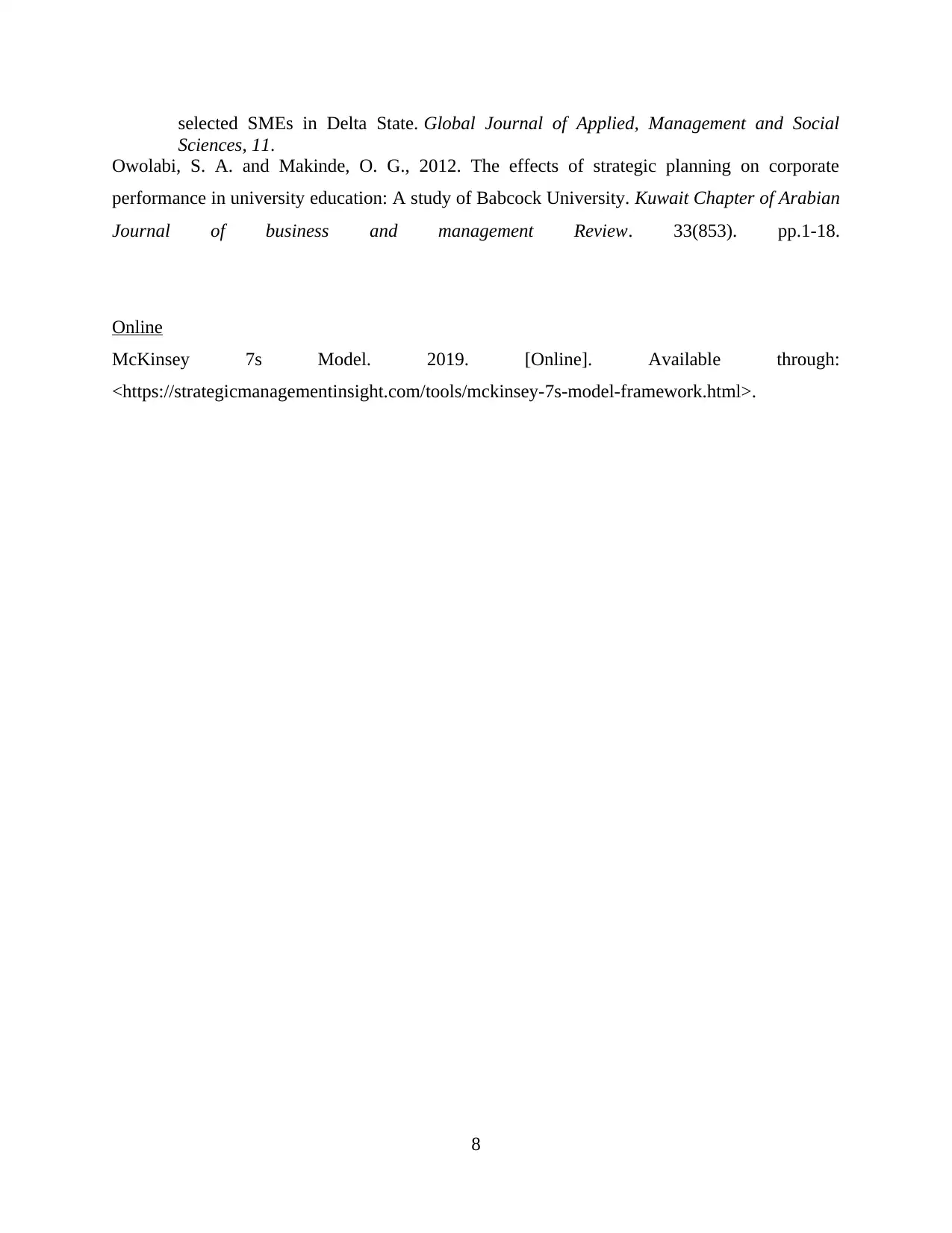
selected SMEs in Delta State. Global Journal of Applied, Management and Social
Sciences, 11.
Owolabi, S. A. and Makinde, O. G., 2012. The effects of strategic planning on corporate
performance in university education: A study of Babcock University. Kuwait Chapter of Arabian
Journal of business and management Review. 33(853). pp.1-18.
Online
McKinsey 7s Model. 2019. [Online]. Available through:
<https://strategicmanagementinsight.com/tools/mckinsey-7s-model-framework.html>.
8
Sciences, 11.
Owolabi, S. A. and Makinde, O. G., 2012. The effects of strategic planning on corporate
performance in university education: A study of Babcock University. Kuwait Chapter of Arabian
Journal of business and management Review. 33(853). pp.1-18.
Online
McKinsey 7s Model. 2019. [Online]. Available through:
<https://strategicmanagementinsight.com/tools/mckinsey-7s-model-framework.html>.
8
1 out of 10
Related Documents
Your All-in-One AI-Powered Toolkit for Academic Success.
+13062052269
info@desklib.com
Available 24*7 on WhatsApp / Email
![[object Object]](/_next/static/media/star-bottom.7253800d.svg)
Unlock your academic potential
Copyright © 2020–2026 A2Z Services. All Rights Reserved. Developed and managed by ZUCOL.
